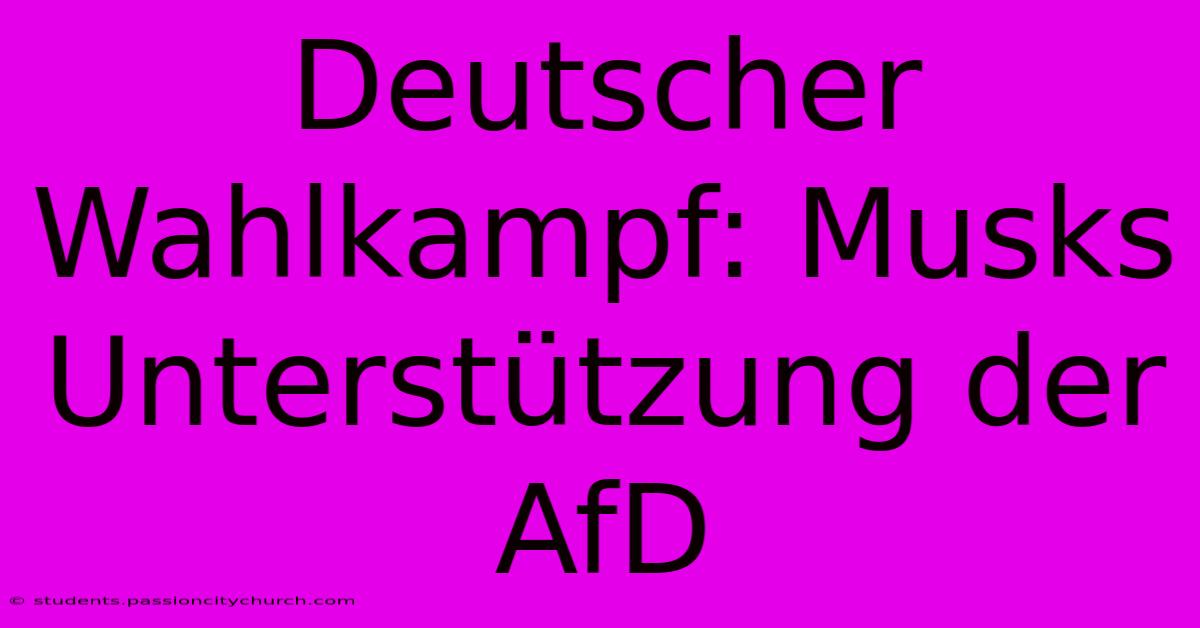Deutscher Wahlkampf: Musks Unterstützung Der AfD

Discover more detailed and exciting information on our website. Click the link below to start your adventure: Visit Best Website. Don't miss out!
Table of Contents
Deutscher Wahlkampf: Musk's Unterstützung der AfD – Ein Mythos und seine Folgen
The German federal election cycle is always a hotbed of political activity, rife with speculation, alliances, and controversies. Recently, a particularly intriguing, albeit largely unfounded, narrative has emerged: the alleged support of Elon Musk for the Alternative für Deutschland (AfD). This article will delve into this claim, examining its origins, dissecting its impact on the German political landscape, and exploring the broader implications of social media influence on electoral processes.
The Spark: Misinterpretations and Misinformation
The supposed "support" of Elon Musk for the AfD hasn't stemmed from any direct statement or endorsement from the Tesla CEO himself. Instead, the narrative has built upon several factors, each contributing to the overall misconception:
-
Algorithmic Amplification: Social media algorithms, particularly on platforms like X (formerly Twitter), often prioritize sensational content, regardless of its veracity. Any vaguely pro-AfD sentiment, even if completely out of context, could be amplified, reaching a far wider audience than it would organically.
-
Misinterpreted Actions: Musk's past actions, such as his often controversial pronouncements on various political issues, have been selectively interpreted to align with supposed AfD sympathies. This cherry-picking of information creates a false narrative that fits pre-existing biases.
-
Strategic Manipulation: Deliberate disinformation campaigns, potentially orchestrated by rival political parties or independent actors, may have contributed to the spread of this false narrative. Such campaigns often rely on creating seemingly credible, yet ultimately false, connections between individuals and political movements.
-
Echo Chambers: The phenomenon of echo chambers, where individuals are primarily exposed to information confirming their pre-existing beliefs, plays a crucial role. Those already inclined to believe in Musk's AfD support are more likely to engage with and share content reinforcing that belief, furthering its spread.
Analyzing the Lack of Evidence:
Crucially, there's no credible evidence to suggest direct support from Elon Musk for the AfD. No official statements, financial contributions, or public endorsements have ever been documented. The narrative rests entirely on speculation and misinterpretations of his broader online activity. This highlights the danger of relying solely on social media for political information, especially during election campaigns.
The Impact on the German Election:
Despite the lack of factual basis, the perceived support of Elon Musk for the AfD has had demonstrable consequences:
-
Increased Visibility for the AfD: The mere suggestion of such a high-profile endorsement, even if false, has undeniably increased the visibility of the AfD among certain segments of the population. This heightened attention, regardless of its source, can translate into increased votes.
-
Polarization of Public Opinion: The Musk-AfD narrative has further polarized the already fragmented German political landscape. It has fueled existing divisions and solidified pre-existing opinions, making constructive dialogue more challenging.
-
Erosion of Trust in Media: The spread of this misinformation undermines public trust in traditional media outlets and journalistic integrity. When false narratives gain significant traction online, the credibility of factual reporting is inadvertently challenged.
-
Influence on Voter Behavior: While the exact impact is difficult to quantify, the false narrative likely influenced the voting behavior of a small but significant subset of the population. Individuals swayed by this misinformation may have cast their votes for the AfD based on a flawed premise.
The Broader Implications:
The case of the supposed Musk-AfD support exemplifies a larger trend: the increasing influence of social media on electoral processes worldwide. The ease with which misinformation can spread online poses a significant threat to democratic systems. This underscores the urgent need for:
-
Media Literacy: Educating the public on how to critically assess information online, identify misinformation, and evaluate the credibility of sources.
-
Platform Accountability: Holding social media platforms accountable for the content they host and taking proactive steps to combat the spread of misinformation.
-
Strengthening Fact-Checking Initiatives: Supporting and expanding independent fact-checking organizations to quickly debunk false narratives and provide accurate information to the public.
-
Promoting Civil Discourse: Encouraging respectful and fact-based discussions about political issues, fostering a climate where critical thinking and reasoned debate can flourish.
Conclusion:
The alleged support of Elon Musk for the AfD remains a myth, fueled by misinterpretations, algorithmic amplification, and strategic misinformation campaigns. However, the consequences of this narrative are real, highlighting the vulnerability of democratic processes to the manipulation of social media. Addressing this challenge requires a multi-faceted approach, encompassing media literacy initiatives, platform accountability, robust fact-checking, and a renewed commitment to civil discourse. The German election, and indeed elections worldwide, depend on a well-informed electorate capable of distinguishing fact from fiction. Only then can the democratic process truly thrive in the digital age.

Thank you for visiting our website wich cover about Deutscher Wahlkampf: Musks Unterstützung Der AfD. We hope the information provided has been useful to you. Feel free to contact us if you have any questions or need further assistance. See you next time and dont miss to bookmark.
Also read the following articles
| Article Title | Date |
|---|---|
| Incident Kerstmarkt Auto Rijdt In Maagdenburg | Dec 21, 2024 |
| Bayern Atropela Leipzig Gols E Vitoria | Dec 21, 2024 |
| Your Areas Peak Wind Times | Dec 21, 2024 |
| Yellow Weather Warning Sunday Storm Aftermath | Dec 21, 2024 |
| Playoff Picks Against The Spread Bets | Dec 21, 2024 |
| La Formacion De Rey Mysterio Jr Por Su Padre | Dec 21, 2024 |
| James Gunn Trailer Superman Terbaru | Dec 21, 2024 |
| Konstas Richardson Boxing Day Call Up | Dec 21, 2024 |
| Exploring The 2024 Winter Solstice Meaning | Dec 21, 2024 |
| El Patriarca Mysterio Una Vida De Lucha | Dec 21, 2024 |
